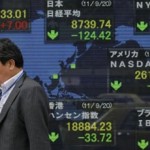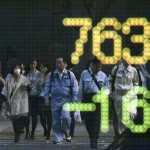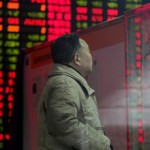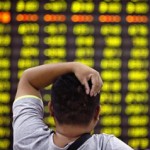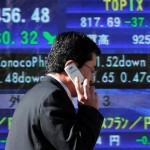China stocks turn higher
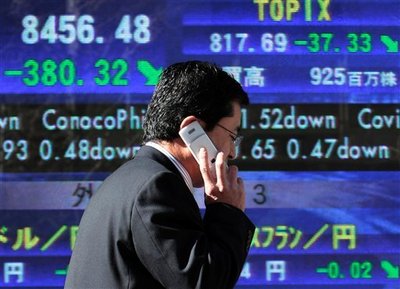
Other Asian markets also edge up on tail of strong U.S. corporate earnings
Stocks in Asia edged higher Tuesday on the tail of strong corporate earnings in the U.S. and China’s stabilizing markets.
The Shanghai Composite Index SHCOMP, +0.48% ticked 0.3% higher to 4002.64 in midday trading, after closing up 0.9% on Monday. Gaining for the fourth-straight session, the index has bounced 14% from its recent low on July 8 but is still off 22.5% from its June 12 peak.
The smaller Shenzhen index 399106, +1.35% increased 0.9% to 2250.76, a day after rising 1.8%.
The Hang Seng Index HSI, +0.38% climbed 0.4% to 25507.76 and was roughly flat on Monday on low trading volumes.
All three indexes opened lower Tuesday but turned higher by midmorning, continuing a recent trend that has seen investors buy up shares over the course of the day.
“China bears can argue that the Chinese regulators have effectively taken the market out of consideration by virtue of the ham-fisted approach to reversing the selloff,” analysts at Alliance Bernstein wrote in a research note Tuesday, but the bulls can argue that the Shanghai Composite is still up more than 90% over the past 12 months.
The firm said “we would avoid the Shanghai market for now” given its volatility and the unpredictability of China’s stock regulator in handling it.
The Shanghai Composite trades at 16.3 times forward earnings, compared with 16.1 times for the S&P 500, but excluding the overrepresentation of low growth financials, the Shanghai benchmark trades at a much higher 26 times, Alliance said.
Elsewhere, Australia’s S&P ASX 200 XJO, +0.53% edged up 0.3% to 5702.2 and South Korea’s Kospi SEU, -0.01% rose 0.1% to 2075.31. Japan’s Nikkei NIK, +0.66% climbed 0.4% to 20739.8.
“U.S. earnings reports are on watch to understand the sector-by-sector impacts, including those from Apple later today,” said Tsutomu Yamada, market analyst at kabu.com Securities.
“Markets are now over the Greek crisis, while clamor over the volatility in Chinese stocks has at least died down for now.”
Stronger-than-expected reports on Monday from Morgan Stanley MS, -0.40% and Halliburton Co. HAL, +1.83% helped push U.S. stocks higher, with the Nasdaq Composite COMP, +0.17% hitting its third-straight record close.
Raw materials prices, though, tumbled overnight, underscoring an increasing aversion to commodity investments as the U.S. Federal Reserve prepares to raise interest rates for the first time in nearly a decade.
Gold continues to hit new five-year lows and traded down 0.4% to $1,102.60 in Asian trade. Analysts say any price below $1,100 an ounce stings, as that is the break-even cost for many miners.
Oil prices also declined with Brent falling 0.3% to $56.51 a barrel. U.S. oil prices dropped below $50 a barrel overnight for the first time since April and recently traded below that psychological threshold at $49.96.
Meanwhile, currencies of commodity-producing countries like Australia have been in decline as export revenue tumbles, hammering economic growth and employment. Tuesday’s modest declines bring the Australian dollar’s AUDUSD, -0.2170% losses for 2015 to 9.9% at US$0.7362.
In other currency markets, Thailand’s baht USDTHB, +0.0580% extended its losses, falling to its weakest in six years against the resurgent U.S. dollar, while South Korea’s won USDKRW, +0.17% hit its weakest point since June 2013.
Higher interest rates would make the U.S. dollar more attractive to investors looking for higher-yielding assets. But the dollar’s gains are a burden for commodities, which are priced in the U.S. currency and become more expensive for overseas buyers when the greenback gains in value.
Source: MarketWatch – China stocks turn higher









